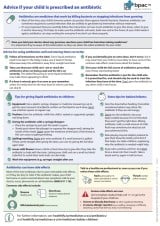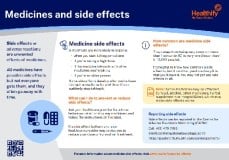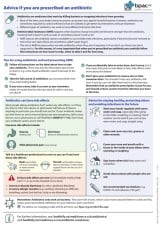You can now add Healthify as a preferred source on Google. Click here to see us when you search Google.
Ethambutol
Sounds like 'eth-am-bew-tol'
Key points about ethambutol
- Ethambutol is used to treat tuberculosis (TB).
- Find out how to take ethambutol.

Ethambutol is used to treat tuberculosis (TB). TB is an infection which mostly affects the lungs, but can affect any part of your body. TB is treated by taking a combination of antibiotics for at least 6 months – ethambutol is just 1 of the antibiotics prescribed. Read more about TB.
In Aotearoa New Zealand ethambutol is available as tablets (100mg and 400mg).
- Always take ethambutol exactly as your doctor has told you. The pharmacy label on your medicine will tell you how much to take, how often to take it and any special instructions.
- The dose of ethambutol is different for different people, depending on your body weight.
- Timing of your dose: Take your ethambutol tablets once a day, at about the same time each day. You can take your dose with or without food. Swallow the tablets whole with a glass of water. Don't crush or chew the tablets.
- Missed dose: If you forget to take your dose, take it as soon as you remember. But if it is nearly time for your next dose, take the next dose at the right time. Don't take extra doses to make up for a forgotten dose. If you often forget to take ethambutol, your tuberculosis may not be fully treated.
- Finish the course. Keep taking your tablets regularly unless your doctor tells you to stop. It's important for you to finish the course so the infection doesn't come back. If you stop taking the tablets before your course has finished (such as if you think you may be developing side-effects – see below) then you must let your doctor know about it straightaway so you can be given different treatment for your TB.
Here are some things to know when you're taking ethambutol. Other things may be important as well, so ask your healthcare provider what you should know about.
- Ethambutol can interact with some medicines, herbal supplements and rongoā Māori, so check with your doctor or pharmacist before starting ethambutol and before starting any new products.
- Limit alcohol while you are taking ethambutol. Alcohol can increase your chance of side effects, eg, problems with your liver.
- Tell your doctor if you're pregnant, planning to become pregnant, or breastfeeding.
- Tell your doctor if you have gout. Ethambutol may cause a gout flare-up.
- Tell your doctor if you notice problems with your eyesight while you're taking ethambutol.
Like all medicines, ethambutol can cause side effects, although not everyone gets them. If you're concerned about any symptoms you think might be related to your medicine, talk to your healthcare provider. The following information offers some guidance but doesn't include all possible side effects.
Common side effects
Tell your healthcare provider if these side effects bother you.
- Nausea (feeling sick), not feeling hungry or a sore tummy.
- Diarrhoea (runny poo): Tell your healthcare provider if your diarrhoea is severe, contains blood or lasts more than a few days. If you have a lot of diarrhoea or have been vomiting and you're taking the oral contraceptive pill, let your healthcare provider know.
Tell your healthcare provider immediately or phone Healthline free on 0800 611 116 if these occur
- Problems with your eyesight such as pain, difficulty telling colours apart, blurry vision, or not being able to see things clearly at the edge of your vision.
- Numbness or tingling feelings in your fingers and toes.
- Skin rash or itching.
- Signs of problems with your liver such as yellowing of the skin or eyes, dark urine, pain in the tummy.
Phone 111 for an ambulance or go to your nearest accident and emergency (A&E) clinic if these occur
- Signs of an allergic reaction such as itchy skin, and rash, swollen lips or tongue, problems breathing, like a tight chest or shortness of breath.
Read more about medicines and side effects and reporting a reaction you think might be a side effect.
The following link has more information about ethambutol:
Ethambutol(external link) New Zealand Formulary Patient Information
Brochures
Advice if you are prescribed an antibiotic(external link) BPAC, NZ, 2024
Advice if your child is prescribed an antibiotic(external link) BPAC, NZ, 2024
Medicines and side effects(external link) Healthify He Puna Waiora, NZ, 2024
References
- Ethambutol(external link) New Zealand Formulary
- Myambutol(external link) Consumer Information, Australia
Brochures

Advice if your child is prescribed an antibiotic
BPAC, NZ, 2024

Medicines and side effects
Healthify He Puna Waiora, NZ, 2024
Credits: Sandra Ponen, Pharmacist, Healthify He Puna Waiora. Healthify is brought to you by Health Navigator Charitable Trust.
Reviewed by: Angela Lambie, Pharmacist, Auckland
Last reviewed:






